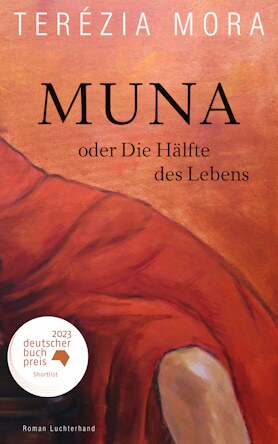Fiction
Terézia Mora
Muna oder Die Hälfte des Lebens
[Muna, or Half a Life]
Translation Grant Programme
Published in Italian with a grant from Litrix.de.
Love and violence
Terézia Mora’s big novel Muna oder Die Hälfte des Lebens (‘Muna, or half of life’)
Few women writing in German write about men as penetratingly as Terézia Mora. She has even devoted an entire trilogy of novels to a male character, the IT specialist Darius Kopp: Der einzige Mann auf dem Kontinent (2009; ‘The only man on the entire continent’), Das Ungeheuer (2013; ‘The monster’) und Auf dem Seil (2019; ‘On a tight-rope’). On the basis of these contemporary novels, but also of her trenchant stories and her translations, Mora has won numerous awards, including, in 2018, Germany’s most prestigious literary prize, the Georg Büchner Prize.
In her new novel Mora, who grew up in Sopron in Hungary but has lived in Berlin since 1990, has for the first time put a woman at the centre of her work: Muna Appelius, a first-person narrator whom the reader is unlikely ever to forget: a strong-minded, vulnerable young woman who has already suffered considerable harm, and who in the course of the book can readily come to be seen by the reader as a close friend, and as a companion who confronts them with penetratingly personal questions, such as: What’s your take on the notion of ‘the great love of one’s life’? On the roles of the sexes? On sexual violence?
The novel begins with Muna screaming with rage in her backyard: yet again her bike has a flat tyre. Muna has recently turned eighteen, and her mother has just tried to kill herself. Her mother is an actress who has become severely alcoholic following the lung-cancer death of Muna’s father, who was poor but ‘exceptionally brilliant’. Their town is called Jüris, which favours the Volksstimme newspaper and boasts a Ratskeller. The GDR, and with it the close-knit theatrical, literary and artistic world in which Muna has grown up, is in the process of collapsing.
Muna would like to be a writer, perhaps a journalist, and applies for internships using the one thing she has to offer: her beauty, her femininity. That’s clearly what she has learnt at her mother’s knee. But she is repelled by her mother’s mantra: ‘They’ll fuck you for certain. Just make sure you fuck them in return.’ To paraphrase Hölderlin’s “ein Anderes immer” in his poem ‘Menons Klagen um Diotima’, she is searching for that ‘special someone’. The person she actually finds is Magnus – a teacher and photographer, and for Muna ‘the most beautiful man I have ever seen’.
For her it is love at first sight, but for him it is just a one-night stand and he disappears in a flash. As does the minor German republic in which both of them grew up, albeit in very different circumstances: Muna in an ancient wreck of a building whose inhabitants smoked too much, drank too much and died too young; Magnus in a system-built high-rise in which the predominant features were discipline, obedience and beatings, and keeping mum as to the degree of his parents’ loyalty vis-à-vis Stasi and the Party. ‘There’s a dark side to him’, avers Muna when trying to describe his magnetism. Muna herself is as bright and alluring as ‘Marilyn’ – her nickname amongst the lads at uni. Before long she is adept at all the roles open to a woman: she can be cool, clever, provocative, stimulating, exciting, she can affect fishnets as well as dungarees; she’s Mona Lisa Marilyn – but her love is reserved for one man only. Seven years after their first brief night together she encounters him again.
In the interim she has known a whole panoply of men: nonchalant Bartley, a lecturer in literature; Frederic, a writer who was always away; Arnold the pub poet; Aria, a generous type. Again and again she was abused by these men, though not always physically. It was meant to be different with Magnus, even if only for ‘a single day’s holiday from hell’. Only with him, declares Muna, ‘do I know that the life I am living is truly mine’. She attaches herself to Magnus to the point of complete self-surrender. He repays her devotion with systematic and ever-increasing brutality. The pair collapse into the unmitigated interdependence of a victim-victimiser relationship that entwines and suffocates them both. They launch themselves into the random milieu of academia – in London, Paris, Vienna, Berlin or wherever, while Muna researches forgotten female writers with a ‘migratory background in the Austro-Hungarian empire’, and Magnus investigates ‘constructions of masculinity’ in literature.
Writing is Muna’s sole means of salvation. Free at last of Magnus, she turns dream sequences into stories. She opens a bookshop with a woman friend, she finds a publisher for her book. The most beautiful and brutal man in all her life had declared imploringly: ‘If only you could stop sounding off!’ Muna had written him letters, which crop up in the novel with multiple crossings-out indicative of self-censorship. It gradually dawns on the reader that the first-person narrator of this novel is a magnificent writer. In the process of recounting her disastrous, destructive love story, Muna, the victim of violence, attains to total autonomy, and the enraged 18-year-old modulates into a self-confident woman given to warm friendship, though right to the final page of this breathtaking novel she keeps popping up with big questions: ‘So what’s your take on the notion of “the great love of one’s life”? On the roles of the sexes? On sexual violence?’
Translated by John Reddick
By Natascha Freundel
Natascha Freundel is a journalist and editor at rbbKultur Radio, where she plans and moderates the podcast and radio debate program “Der Zweite Gedanke”. She also writes literary criticism and regularly serves as moderator at cultural events, including, among others, the German-Israeli Literature Festival in Berlin.


